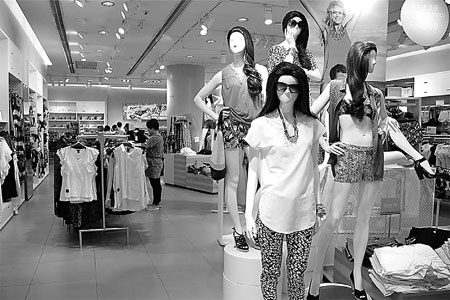Fast-fashion retailers challenging sports brands
Updated: 2014-04-06 08:05
By Wang Zhuoqiong(China Daily)
|
|||||||||
Adaptability, affordable prices lure shoppers to rising number of stores
The growth of sportswear products has been increasingly challenged by the rapid expansion of fast-fashion retailers in China, where consumers are more sensitive to fashion and price tags, industry experts said.
Zhang Qing, founder and CEO of Beijing Key-Solution Sports Consulting Co Ltd, said the fast-fashion brands' growing territory at shopping malls has offered more access to Chinese consumers than those from sports brands.
International fast-fashion retailers have quickly expanded their presence in major cities by opening new stores with various brands.
Gap Inc's fiscal year 2013 results show that its net sales grew 5 percent to $16.5 billion. Last year, the company expanded its Gap store base on the Chinese mainland by opening 34 stores, for a total of 81 stores, inclusive of Gap outlet stores. The brands expect to open about 30 additional Gap stores in China during 2014 fiscal year. This year, Gap also debuted its Old Navy brand in China with about five stores.
The H&M Hennes & Mauritz AB reported that its 2013 profit increased from 22.3 billion Swedish krona ($3.4 billion) to 22.5 billion krona with China and the United States being its largest expansion markets, contributing to a total of 356 new stores globally compared with 304 of the year before. This year, the group plans to open about 375 new stores, with majority of them in China and the United States.
Sales in China increased last year from 5.4 billion krona to 6.6 billion krona. H&M closed three stores but opened 74 new ones, bringing the total of stores in the country to 205. The group comprises six independent brands: H&M, COS, Monki, Weekday, & Other Stories and Cheap Monday.
Net sales of Inditex Group, the parent company of Zara, another fast-fashion giant, climbed 5 percent to 16.7 billion euros ($23 billion) in 2013, with net income increasing 1 percent over a year earlier to 2.4 billion euros.
The group opened 331 stores in 61 markets globally, for a total of 6,340 stores. In the past three years, its net profits have been grown in the double digits.
Inditex has eight brands, including Pull&Bear, Massimo Dutti, Bershka, Stradivarius, Oysho and Zara Home.
Hermann Ng, chief executive officer of Retail Nation, said international fast-fashion retailers have grown by about 20 to 30 percent in China, mainly fueled by new stores in new marketplaces. "Their expansion has not saturated yet," said Ng. "They are still in the honeymoon phase."
The major attraction of fast-fashion brands for Chinese consumers lies in their quickly adapted styles and affordable prices, he said, especially compared with international sports brands, which have been focusing on sport performance.
"Sports brands with emphasis on their professional performance are often priced twice to three times higher than fast-fashion brands," said Ng. "For Chinese consumers who are not developing exercise as a major lifestyle, it is a luxury to purchase a pair of sports shoes."
But sports brands will lose a major share of the market if they focus only on the sports professional category of products, which is pushing them to collaborate with fashion retailers to attract more consumers, Ng said.
|
An H&M store in Guangzhou, Guangdong province. The company reported that its 2013 profit increased from 22.3 billion Swedish krona ($3.4 billion) to 22.5 billion krona, with China and the United States being its largest expansion markets. Provided to China Daily |
(China Daily 04/06/2014 page9)
